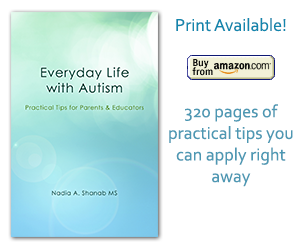Should You Tell Your Child about Her Diagnosis?
Nadia Shanab | Uncategorized25 Sep 2013
The answer to this question depends mainly on the child’s level of awareness of herself, both socially and cognitively.
Some high-functioning children already know that they have autism. They know their condition very well, and are able to describe it precisely. This category of children knows its strengths as well as its weaknesses. Moreover, they are tracking their progress over the years and know about the phases they are going through.
To my biggest surprise some students are aware of how much they can do by themselves, and when they need help. They have already thought about their future and know what they would love to do when they grow up.
In this case you can easily approach your child and tell her that she is officially diagnosed with autism. Now be prepared and open to answer her questions. I would guess that the child’s first question might be: “Why do I have autism?” and “How can I fix it?”
The answer could be something like: “We are all different, being different is fine, but different doesn’t mean inferior.” Of course you want to elaborate more and stress on your child’s strengths, rather than her weaknesses. Always show her your love and support. Explain to your child that each brain in the world has a different wiring. That is the reason why every person is unique, like fingerprints. This is a great opportunity for the family to start planning for the future. You can also collaborate with your doctor to tell your child about her diagnosis. Developmental pediatricians have their own professionel though delightful ways to approach children without making them worry.
In the second category children are confused and unsure of their status. They don’t really understand why they are sometimes in their Special Day Class (SDC) and why do they have to go to a mainstream class. They hear kids in general education talking about them as “special needs students”. In their mind they probably wonder what that means, but they rarely express their concerns. Often times, they ask to go back to their comfort zone, namely their SDC.
In this case you don’t have to disclose your child’s diagnosis to her. She might not understand the concept or the meaning of autism. However, if she starts increasingly asking questions about her status in school, explain to her that sometimes she needs to be in a smaller class because she can do a better job there, and that she also has other friends in this class. Work on the positive side of her position in school. I doubt in this case that your child would ask you why is she different. If she does, you respond as mentioned above. The child in this case has a potential to develop and advance on the autism spectrum. If she turns to become part of the above category, wait for the right time to tell her. She may surprise you with the question one day.
The third category includes lower-functioning children. There is no need to announce the diagnosis. The child will most probably not benefit from this piece of information.
Regardless of what category your child belongs to, try to raise awareness in your surroundings: your community, school, neighborhood, family and friends, and support groups. Awareness can dissolve many conflicts, improve communication, increase the support to the entire autism community. Let your child know that there is nothing to be ashamed of. Your child should feel proud to be herself no matter what. This feeling will make her enjoy a peaceful life.
nadia shanab
Tags: autism, communication, developmental pediatrician, diagnosis, health, parenting, placement, tips
